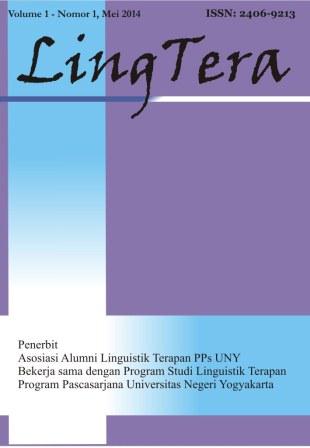Constructivism-based pathways: Revolutionizing EFL writing instruction for adult learners
DOI:
https://doi.org/10.21831/lt.v11i1.70575Keywords:
constructivist, learning, model, writing, self-inquiry, andragogyAbstract
References
Asandhimitra et al. (2004). Pendidikan tinggi jarak jauh (S. Setijadi & I. Warden, Eds.; 1st ed.). Pusat Penerbitan Universitas Terbuka. http://repository.ut.ac.id/4178/1/UTPTIJJ-ALL.pdf
Barella, Y. (2014). The roles of English teacher working group (MGMP) to support teacher professional development. Pascasarjana Universitas Sebelas Maret. https://digilib.uns.ac.id/dokumen/detail/37725
Berns, A., Isla-Montes, J. L., Palomo-Duarte, M., & Dodero, J. M. (2016). Motivation, students' needs and learning outcomes: A hybrid game-based app for enhanced language learning. SpringerPlus, 5(1), 1–23. https://doi.org/10.1186/S40064-016-2971-1/TABLES/8
Blanchard, K. L., & Root, C. B. (2010). Ready to write 1: A first composition text.
Boekaerts, M., & Minnaert, A. (2007). Affective and motivational outcomes of working in collaborative groups. Educational Psychology, 26(2), 187–208. https://doi.org/10.1080/01443410500344217
Brown, H. D., & Lee, H. (2015). Teaching by principles: An interactive approach to languag pedagody. 1–685.
Calvert, L. (2016). The power of teacher agency. 37(2), 52–56.
Chen, E., Heritage, M., & Lee, J. (2009). Identifying and monitoring students' learning needs with technology. Journal of Education for Students Placed at Risk (JESPAR), 10(3), 309–332. https://doi.org/10.1207/S15327671ESPR1003_6
Conner, L. N. (2013) Students use of evaluative constructivism: comparative degrees of intentional learning, International Journal of Qualitative Studies in Education, 27(4), 472–489. https:// doi.org/10.1080/09518398.2013.771228.
De Silva, K. R. M. (2010). The impact of writing strategy instruction on EAP students' writing strategy use and writing performance. University of Reading.
Folse, K., Muchmore-vokoun, A., & Solomon, E. V. (2014). Book reviews great writing 2: Great paragraphs (4th Eds.). 86–90.
Gagnon, G. W., & Collay, Michelle. (2005). Constructivist learning design: Key questions for teaching to standards. SAGE Publications.
Hatami, S. (2013). Learning styles. ELT Journal, 67(4), 488–490. https://doi.org/10.1093/ELT/CCS083
Helmy, R. V. (2018). The strategy in improving English teachers' professionalism through MGMP. 3(1), 345–253. https://ojs.iainbatusangkar.ac.id/ojs/index.php/proceedings/article/view/1327
Herrington, J., & Oliver, R. (2000). An instructional design framework for authentic learning environments. Educational Technology Research and Development, 48(3), 23–48. https://doi.org/10.1007/BF02319856
Johns, C. (2020). Reflexive narrative: Self-inquiry toward self-realization and its performance. SAGE Publication Inc.
Karagiorgi, Y., & Symeou, L. (2005). Translating constructivism into instructional design: Potential and limitations on JSTOR. Education Technology & Society, 8(1), 17–27.
Kearsley, G. (2010). Andragogy (M. Knowles). The theory into practice database.
Kumaravadivelu, B. (2001). Toward a postmethod pedagogy. TESOL Quarterly, 35(4), 537. https://doi.org/10.2307/3588427
Ladkin, D. (2016). "˜The enigma of subjectivity': How might phenomenology help action researchers negotiate the relationship between "˜self', "˜other' and "˜truth'? SAGE Journal, 3(1), 108–126 https://doi.org/10.1177/1476750305049968
Levy, H. M. (2010). Meeting the needs of all students through differentiated instruction: Helping every child reach and exceed standards. The Clearing House, 81(4), 161–164. https://doi.org/10.3200/TCHS.81.4.161-164
Mupinga, D. M., Nora, R. T., & Yaw, D. C. (2010). The learning styles, expectations, and needs of online students. College Teaching, 54(1), 185–189. https://doi.org/10.3200/CTCH.54.1.185-189
Nie, Y., & Lau, S. (2010). Differential relations of constructivist and didactic instruction to students' cognition, motivation, and achievement. Learning and Instruction, 20(5), 411–423. https://doi.org/10.1016/J.LEARNINSTRUC.2009.04.002
O'Brien, T. (2004). Writing in a foreign language: Teaching and learning. Language Teaching, 37(1), 1–28. https://doi.org/10.1017/S0261444804002113
Ovens, A., & Fletcher, T. (2014). Doing self-study: The art of turning inquiry on yourself (pp. 3–14). https://doi.org/10.1007/978-3-319-05663-0_1
Parkay, F. W., Anctil, E. J., & Hass, Glen. (2006). Curriculum planning: A contemporary approach. 540.
Pashler, H., McDaniel, M., Rohrer, D., & Bjork, R. (2008). Learning styles: Concepts and evidence. Psychological Science in the Public Interest, Supplement, 9(3), 105–119. https://doi.org/10.1111/j.1539-6053.2009.01038.x
Purwati, D., Mardhiah, A., Nurhasanah, E., & Ramli, R. (2022). The six characteristics of andragogy and future research directions in EFL: A literature review. Elsya: Journal of English Language Studies, 4(1), 86–95. https://doi.org/10.31849/ELSYA.V4I1.7473
Richardson, V. (1997). Constructivist Teaching and Teacher Education: Theory and Practice.
Shah, R. K. (2022). Effective constructivist teaching learning in the classroom by Rajendra Kumar Shah: SSRN. Shanlax International Journal of Education, 7(4), 1–13.
Singer, F. M., & Moscovici, H. (2008). Teaching and learning cycles in a constructivist approach to instruction. Teaching and Teacher Education, 24(6), 1613–1634. https://doi.org/10.1016/J.TATE.2007.12.002
Terhart, E. (2010). Constructivism and teaching: A new paradigm in general didactics? Journal of Curriculum Studies, 35(1), 25–44. https://doi.org/10.1080/00220270210163653
Tiilikainen, M., Karjalainen, J., Toom, A., Lepola, J., & Husu, J. (2017). The complex zone of constructivist teaching: A multi-case exploration in primary classrooms. Research Papers in Education, 34(1), 38–60. https://doi.org/10.1080/02671522.2017.1402080
Torbert, W. R. (2001). The practice of action inquiry. In P. Reason & H. Bradbury (Eds.), Handbook of Action Research (pp. 250–260). Sage.
Wong, R. (2020). Becoming an EFL teacher: A re-investigation of student teachers' motivation. English Language Teaching, 13(5), 64–79. https://doi.org/https://doi.org/10.5539/elt.v13n5p64
Zulela, MS., & Rachmadtullah, R. (2019). Constructivism approach in learning to write narrative at elementary school. Proceedings of the 1st International Conference on Innovation in Education (ICoIE 2018), 287–290. https://doi.org/10.2991/ICOIE-18.2019.64
Downloads
Published
How to Cite
Issue
Section
Citation Check
License
LingTera allows readers to read, download, copy, distribute, print, search, or link to its articles' full texts and allows readers to use them for any other lawful purpose. The journal allows the author(s) to hold the copyright without restrictions. Finally, the journal allows the author(s) to retain publishing rights without restrictions.
- Authors are allowed to archive their submitted articles in an open-access repository.
- Authors are allowed to archive the final published article in an open-access repository with an acknowledgment of its initial publication in this journal.

Psychology, Evaluation, and Technology in Educational Research is licensed under a Creative Commons Attribution-ShareAlike 4.0 International License.
Based on a work at https://petier.org/index.php/PETIER.









